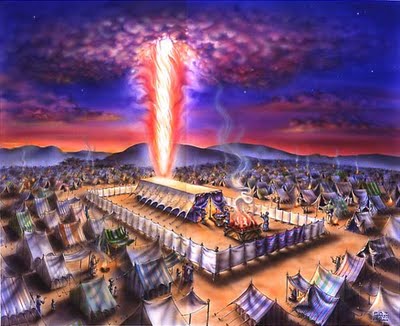The Call From the Wilderness
Bamidbar – במדבר : “In the wilderness”
Bible Reading- Torah : Numbers 1:1-4:20 Haftarah : Hosea 2:1-22 Gospel : John 1-2
A wilderness is a barren wasteland that is without the usual food and water needed for day to day living.
The book of Numbers opens with the words, “The LORD spoke to Moses bamidbar (in the wilderness) …” The word bamidbar (במדבר) means “in the wilderness.” The Hebrew name of the book is Bamidbar. “In the wilderness” is a good description of the stories in the book of Numbers because this fourth book of the Scripture records events that occurred over the thirty-nine years of the wilderness wanderings.
 It was in the wilderness that Israel had to depend on the Lord. He provided manna from heaven and water from a rock, but even greater He provided His living word for His people to live. Our Lord Jesus also spent time in the wilderness. It was in the wilderness that the Lord fasted for 40 days and was then tempted by Satan. During this tempting, Jesus quoted scripture when He stated that man should not live by bread alone, but by every word that proceeds from the mouth of the LORD. Duet 8:3
It was in the wilderness that Israel had to depend on the Lord. He provided manna from heaven and water from a rock, but even greater He provided His living word for His people to live. Our Lord Jesus also spent time in the wilderness. It was in the wilderness that the Lord fasted for 40 days and was then tempted by Satan. During this tempting, Jesus quoted scripture when He stated that man should not live by bread alone, but by every word that proceeds from the mouth of the LORD. Duet 8:3
The wilderness is a time to forge anew the man or woman of God. This is not just a metaphor, there are many times in our lives when we have lack in our lives, but the choice is always the same. Do we rely on God for what we need or do reject His provision and try to solve the problem ourselves. When we chose the Lord, He may not remove us from the wilderness. Jesus moved from one temptation to the next, He even called upon the Father to remove from Him the cup of the crucifixion but in trusting the Father He still drank.
In Deuteronomy 8, Moses warns Israel against success and prosperity that might harden their hearts, causing them to forget God. He reminds Israel that God led them “through the great and terrible wilderness, with its fiery serpents and scorpions and thirsty ground where there was no water.” (Deuteronomy 8:15)
Wilderness is a place of refuge, provision and revelation. It is not necessarily a bad thing. Since wilderness requires us to rely on God, it can nurture spiritual health. The prophets sometimes look back at the wilderness experience nostalgically as they remember the romance of Israel following God through the desert. The prophet Jeremiah says:
Go and proclaim in the ears of Jerusalem, saying, “Thus says the LORD, ‘I remember concerning you the devotion of your youth, the love of your betrothals, your following after Me in the wilderness, through a land not sown.'” (Jeremiah 2:2)
Through the prophet Hosea, the LORD says of unfaithful Israel, “Behold, I will allure her, bring her into the wilderness and speak kindly to her.” (Hosea 2:14)
God instituted the Feast of Tabernacles as an annual remembrance of Israel’s wilderness experience. (Leviticus 23:42-43) The festival is strategically placed right after the harvest. When the Israelite was enjoying a sense of success and abundance, God wanted him to remember the historic wilderness experience of his forefathers. God wants us to remember the days in the wilderness, lest we forget that He is our true provider. “Otherwise, you may say in your heart, ‘My power and the strength of my hand made me this wealth.'” (Deuteronomy 8:17)
It easy to forget that the Lord has saved us and that it is Him we should trust for our daily bread. It was from the wilderness that God sent John the Baptist to call God’s people to repent and return to God. That same call is being issued today. Through the economic and political turmoil and even the natural disasters, the Lord issues His call, His warning to turn from our wicked ways and in all that we do seek Him.

